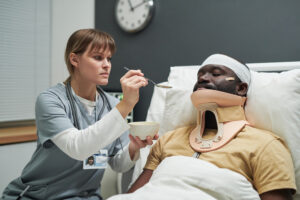
Read on to learn more about who’s responsible for paying your medical bills after a car accident, and what you can do to obtain compensation for your losses.
Who Covers My Medical Bills After an Auto Accident?
As a no-fault state, Florida requires all of its drivers to have at least $10,000 of personal injury protection, or PIP, insurance. So, each driver’s insurance covers their medical bills (up to the policy limit), no matter which party is technically responsible for the crash. PIP coverage can be used for up to 80% of your medical bills, and non-emergency medical condition expenses are limited to $2,500 of your coverage.
But, what about the portion of your medical bills not covered by PIP insurance? Especially if your injuries are severe or require ongoing care, this amount may be significant. When you do, your next option is to seek compensation with a legal case.
Your ability to reap compensation with an auto accident case will depend on the crash’s circumstances. More specifically, you can seek compensation from the other driver’s insurance carrier and/or file a lawsuit if another party’s negligent behavior was responsible for the accident.
Before submitting a claim to your PIP insurance company, you should speak to an auto accident attorney to learn more about your rights and steps to pursue your personal injury case. Our experienced attorneys will fight for your rightful compensation to cover medical bills and other accident-related damages.
Reach out to the team at Weldon & Rothman, PL today for a free case review.
